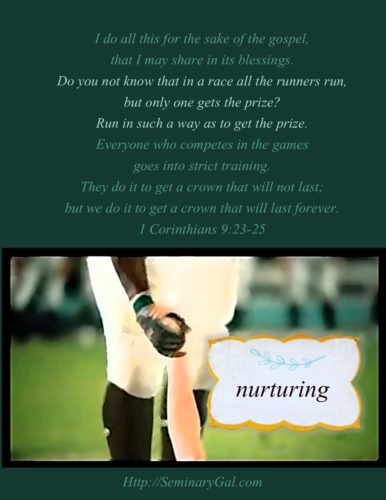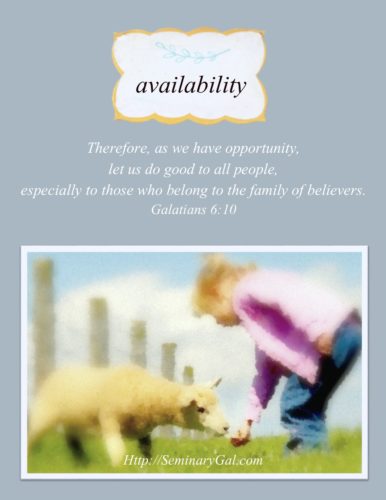How good are you at receiving criticism? If you’re like me, that question brings a decided “Ouch!” As we transition from the tiny virtues of the heart to the tiny virtues of the mind, we cannot help but see that our hearts and our minds have a certain connection. Our minds do not exist independently from our hearts.
When someone has a critique to offer, what is your default response?
 To listen carefully and examine your heart to see if it applies?
To listen carefully and examine your heart to see if it applies?- To reciprocate and find fault in the fault-finder?
- To lash out in anger?
- Or do you just feel wounded?
Sure, it can depend on who is offering the criticism and the heart (or lack of heart) with which the person offers it. But for some of us, it’s just really hard to accept criticism and let it change us for the better. I submit to you that chronically rejecting criticism is a pride-response.
The proud heart and proud intellect hate to admit that he or she is wrong.
That’s the bad news. But the good news is that we can grow in these Tiny Virtues for Exemplary Christian Living and learn how to receive criticism in a godly way.
* * *
He is on the path of life who heeds instruction, But he who forsakes reproof goes astray.” (Proverbs 10:17)
We could all learn from a man like Apollos about how to receive criticism.
Acts 18:24 Meanwhile a Jew named Apollos, a native of Alexandria, came to Ephesus. He was a learned man, with a thorough knowledge of the Scriptures. 25 He had been instructed in the way of the Lord, and he spoke with great fervor and taught about Jesus accurately, though he knew only the baptism of John. 26 He began to speak boldly in the synagogue. When Priscilla and Aquila heard him, they invited him to their home and explained to him the way of God more adequately. 27 When Apollos wanted to go to Achaia, the brothers encouraged him and wrote to the disciples there to welcome him. On arriving, he was a great help to those who by grace had believed. 28 For he vigorously refuted the Jews in public debate, proving from the Scriptures that Jesus was the Christ.
Apollos had every reason to reject criticism. He was learned with a thorough knowledge. He had been instructed and spoke with great passion and accuracy. But he was missing some details. Perhaps Priscilla and Aquila were gracious beyond words and encouraged him privately in the way of God. The Scriptures say they “explained…more adequately.” They didn’t admonish or correct with a heart of superiority. But they did offer criticism and instruction. And Apollos received it well.
Ponder today: how you can be better at offering and receiving criticism
Bible characters of the day: Apollos, Priscilla, and Aquila.
 There are a lot of people out there thinking that respect is owed no matter what. They demand it… from others… as if it’s only
There are a lot of people out there thinking that respect is owed no matter what. They demand it… from others… as if it’s only  “You don’t know what it’s like because you’re not black,” he chided me angrily. I suggested to him that I could, however, empathize with the pain of discrimination because I have experienced it as a woman. Same sin, different target, I explained. He wasn’t buying it. Empathy is one of the
“You don’t know what it’s like because you’re not black,” he chided me angrily. I suggested to him that I could, however, empathize with the pain of discrimination because I have experienced it as a woman. Same sin, different target, I explained. He wasn’t buying it. Empathy is one of the 
 Today is the 15th anniversary of the terror attack upon the Twin Towers of the World Trade Center. Any of us alive and of an age to remember anything probably remember how we felt, where we were, and the deep, deep sorrow for a world that had-in a span of dark minutes-breached every code of human decency. Remembering this event arouses not only a righteous anger against that kind of evil, but it also stirs the wellspring of love and compassion in the soul and spirit of the tender-hearted. Of the exemplary Christian.
Today is the 15th anniversary of the terror attack upon the Twin Towers of the World Trade Center. Any of us alive and of an age to remember anything probably remember how we felt, where we were, and the deep, deep sorrow for a world that had-in a span of dark minutes-breached every code of human decency. Remembering this event arouses not only a righteous anger against that kind of evil, but it also stirs the wellspring of love and compassion in the soul and spirit of the tender-hearted. Of the exemplary Christian. I cannot deny that Mary chose better. She chose listening (
I cannot deny that Mary chose better. She chose listening ( According to the Beatles, we need help when we’re old, when we’re lacking confidence, when we’re lonely, when we’re down, when we have a tendency to rely only upon ourselves but suddenly find that we’re not enough, and when we lose our footing in life.
According to the Beatles, we need help when we’re old, when we’re lacking confidence, when we’re lonely, when we’re down, when we have a tendency to rely only upon ourselves but suddenly find that we’re not enough, and when we lose our footing in life.
 We’re in a series on the
We’re in a series on the  Oh it’s not like the half a million friends some people have on Facebook that they managed to secure with the email address “friend finder.” I hesitate to see what “friends” might turn up if Facebook looked at email addresses to find friends for me. I’ve received emails from businesses, church leaders with whom I’ve disagreed, spammers, Internet trolls, Christ haters, etc., by answering Bible questions via email over the years. Yes, some would be genuine friends with whom I’ve had correspondence for a decade or more. Others, well, let’s just say the word “friend” would involve quite a stretch of the imagination.
Oh it’s not like the half a million friends some people have on Facebook that they managed to secure with the email address “friend finder.” I hesitate to see what “friends” might turn up if Facebook looked at email addresses to find friends for me. I’ve received emails from businesses, church leaders with whom I’ve disagreed, spammers, Internet trolls, Christ haters, etc., by answering Bible questions via email over the years. Yes, some would be genuine friends with whom I’ve had correspondence for a decade or more. Others, well, let’s just say the word “friend” would involve quite a stretch of the imagination.